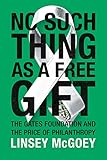No such thing as a free gift : the gates foundation and the price of philanthropy / Linsey McGoey.
Material type: TextPublication details: London : Verso, 2015.Description: 296 p. ; 22 cmISBN:
TextPublication details: London : Verso, 2015.Description: 296 p. ; 22 cmISBN: - 9781784780838 (hbk.)
- Gates, Bill, 1955-
- Bill & Melinda Gates Foundation
- Charities -- United States
- Corporations -- United States
- Charitable uses, trusts, and foundations -- United States
- Social control -- United States
- SOCIAL SCIENCE / Philanthropy & Charity
- SOCIAL SCIENCE / Developing Countries
- SOCIAL SCIENCE / Poverty & Homelessness
- 361.7632 MCG 23
- 361.7/632
- HV97.B5 M34 2015
- SOC033000 | SOC042000 | SOC045000
| Item type | Current library | Shelving location | Call number | Status | Date due | Barcode | Item holds | |
|---|---|---|---|---|---|---|---|---|
|
|
Field Institute Library Bengaluru | 361.7632 MCG (Browse shelf(Opens below)) | Available | BDI67 | ||||
|
|
Gulbanoo Premji Library, Azim Premji University, Bengaluru | 2nd Floor | 361.7632 (Browse shelf(Opens below)) | Available | 27978 |
"Philanthro-capitalism: How charity became big business The charitable sector is one of the fastest-growing industries in the global economy. Nearly half of the more than 85,000 private foundations in the United States have come into being since the year 2000. Just under 5,000 more were established in 2011 alone. This deluge of philanthropy has helped create a world where billionaires wield more power over education policy, global agriculture, and global health than ever before. Charities link the farmers in Africa to the boardrooms of corporate foundations and the corridors of the World Economic Forum at Davos. Far from being selfless, plutocratic philanthropy may be the ultimate profit-making tool. In No Such Thing as a Free Gift, author and academic Linsey McGoey puts this new golden age of philanthropy under the microscope--paying particular attention to the Bill and Melinda Gates Foundation. As large charitable organizations replace governments as the providers of social welfare, their largesse becomes suspect. The businesses fronting the money often create the very economic instability and inequality the foundations are purported to solve. We are entering an age when the ideals of social justice are dependent on the strained rectitude and questionable generosity of the mega-rich"--
"PHILANTHRO-CAPITALISM: HOW CHARITY BECAME BIG BUSINESS The charitable sector is one of the fastest-growing industries in the global economy. Nearly half of the more than 85,000 private foundations in the United States have come into being since the year 2000. Just under 5,000 more were established in 2011 alone. This deluge of philanthropy has helped create a world where billionaires wield more power over education policy, global agriculture, and global health than ever before. Charities link the farmers in Africa to the boardrooms of corporate foundations and the corridors of the World Trade Forum at Davos. Far from being selfless, plutocratic philanthropy may be the ultimate profit-making tool. In No Such Thing as A Free Gift, author and academic Linsey McGoey puts this new golden age of philanthropy under the microscope--paying particular attention to the Bill and Melinda Gates Foundation. As large charitable organizations replace governments as the providers of social welfare, their largesse becomes questionable. The businesses fronting the money often create the very economic instability and inequality the foundations are purported to solve. We are entering an age when the ideals of social justice are dependent on the strained rectitude and questionable generosity of the mega-rich"--
There are no comments on this title.

